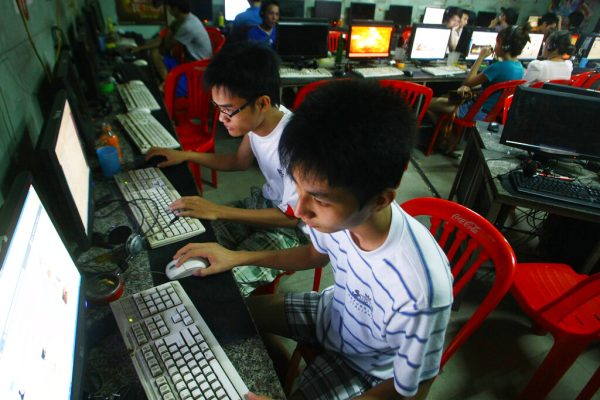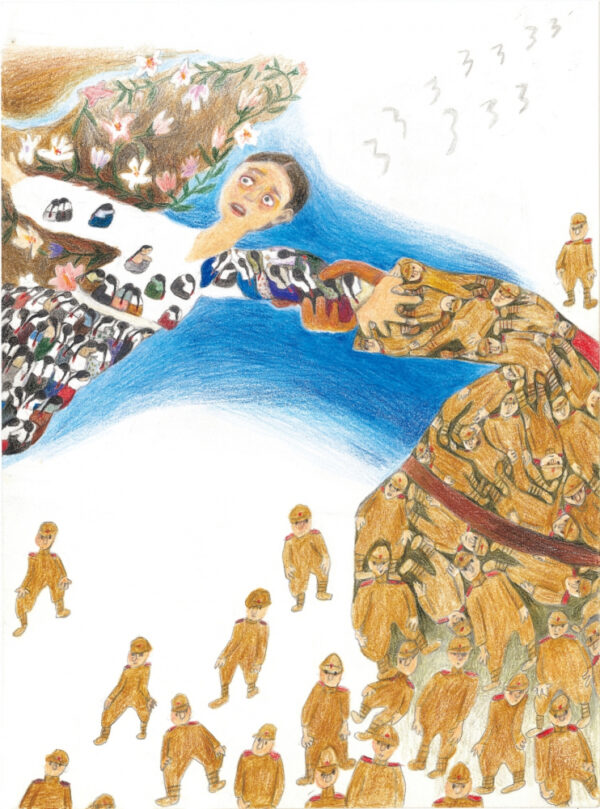The decade of 2020 marks Vietnam’s digital transformation. According to the World Bank, Vietnam entered the transitioning stage in 2021 with high internet penetration but lacks connectivity infrastructures and innovation in the digital economy.[1] Vietnam’s internet penetration rate stood high at 79.1 percent in 2024, with 78.44 million active internet users.[2] Simultaneously, the Vietnamese government has drastically improved digital connectivity. Besides public health measures, in October 2022, Decree 53–––known as the Law on Cybersecurity–––regulated the data storage of enterprises to be retained in Vietnam and enabled the government to tackle illegal cyberspace activities.[3] In July 2024, the government issued a new chip-based Citizen Identification Card (CCCD) that collected fingerprints, iris, and facial image biometrics, which can be used for accessing services.[4]
This article challenges the bureaucratic argument that the increased grasp of state biopolitical control is purely for “development” and “improvement.”[5] The digital transformation in Vietnam enables greater information control by the state. The population must surrender privacy and internet freedom for greater state biopower and state surveillance. Some surveilled Vietnamese citizens have raised concerns about the state’s genuine desire to improve the citizens’ quality of life. The Cybersecurity Law Amendments and the CCCD can be seen as draconian measures that consolidate digital authoritarianism and ultimately prolong the Vietnamese state’s longevity.
The Digitalized Octopus: The New Citizenship ID (CCCD)
CCCD is the Vietnamese government’s effort to encode population statistics digitally. The state claims that the collection of information helps citizens to “carry out administrative procedures easily, accurately, and effectively” and to integrate the use of VNeID (Vietnam e-ID) into insurance, banking, driver’s license, and household registration services; however, the rhetoric has proven to be faulty.[6] Besides the standard information that would appear on ID elsewhere, the electronic chip encrypts highly personal information, including permanent and temporary residence addresses, biometric information about fingerprints, iris recognition, and facial images.[7] The new e-ID also comes with a QR code, which includes the full name, personal photo, ID number, and date of birth[8]
Because the CCCD carries so much personal information, the increased reliance on VNeID for daily functions results in the citizens’ susceptibility to cyber crimes. Online loan procedures, for example, require their borrowers to send pictures of both sides of their CCCD. Therefore, when criminals gain access to other citizens’ photocopies of other citizens’ CCCD, the criminals can illegally borrow money on their behalf.[9] Most importantly, most smartphones nowadays integrate Near-Field Communications (NFC) technology, which allows personnel to read the information from the chip within seconds, putting the citizens’ cybersecurity at risk.[10]
Moreover, the CCCD enlarges the state’s ability to track its citizens, constructing a Foucauldian panopticon society. In addition to the physical card, about 58% of citizens have downloaded the VNeID app.[11] The app has the same legal value as the ID card, driver’s license, vehicle registration certificate, health insurance, birth certificate, and passport.[12] This app consents to the Ministry of Public Security accessing population data, biometric identification, and electronic authentication on its citizens’ phones. The pervasiveness of the app allows the state to surveil its subjects more easily, but also enables subjects to surveil each other, as the app has a function that allows residents to “report crimes” confidentially for whistleblowers.[13] Even though the state adopted rhetorics such as “minimizing waste and errors” or “streamlining administrative procedures” to promote the use of the VNeID app, the state can hardly refute the claim that CCCD did not safeguard cybersecurity but merely infringed on its citizens’ privacy for better surveillance on its subjects.[14] The tightened grip allows the Vietnamese state to hold onto biopower, disciplining its citizens to the state norms: to embrace a state-led, digitalized surveillance society filled with “convenience,” “efficiency” and “modernity.”[15]
Legalizing Censorship: Cybersecurity Law Amendments
While the Vietnamese state grappled with the control of population biometrics by gathering Personal Identifiable Information (PII), Decree 53 is a more overt attempt at censorship and authoritarianism within Vietnam. In 2024, 73.3% of the population were social media users.[16] Despite official claims that Decree 53 aims at making the 2018 Cybersecurity Law “more enforceable in practice,” the Law was seen to limit internet freedom by capturing social media and online news.[17] The online media Zing News was fined twice in 2023 and even had its press license suspended for three months, the government did not disclose specific reasons for such, except that its coverage exceeds “its mandate as a digital magazine.”[18] Zalo, the Vietnam-grown and most popular messaging app, is legally bound to provide user data upon government request.[19] These data include “Zalo Connect,” which pinpoints users’ specific coordinates. The Law enables the police to use the user data collected in the name of “fighting against crime,” while in reality, it is more to fight against online dissidents than actual criminals.[20]
Recent decrees and codes exacerbated state internet manipulation on international social media. Decree 147 taking effect on Christmas 2024 indicates that all Vietnamese social media users must authenticate their identity, including names and dates of birth, using their phone numbers or even phone numbers or personal identification numbers when using multinational social media platforms.[21] Most companies involved in digital network services must store the personal data of Vietnamese users for at least 24 months and provide that data to the government on request, providing the government retroactivity on criminalizing netizens’ “faulty behaviours.[22]
Decree 147 is pursuant of the 2013 decree 72, which expanded that social network Organizations, local or international, should remove or block information that is “opposing the State,” “undermining the national security and social order and safety” or “sabotaging the great national unity bloc.”[23] In June 2023, according to The Washington Post, Meta had an internal list of “inviolable” officials of the Vietnamese Communist Party, strictly censoring any criticism of these officials on Facebook.[24] These legal codes not only made biometric information more accessible to the state, but also caused chilling effects when expressing opinions about the state in cross-border social media. In turn, foreign internet users can only perceive the “pro-state” narratives from Vietnamese users, which is useful for the state to create a facade of “national security and harmonious social order,” consolidating its autocratic rule in Vietnam.
As a developing country, digitalizing population statistics and maintaining cybersecurity is essential for Vietnam to evolve into a productive economy and an efficient polity.[25] However, in this article, it is evident that the digital transformation and legalization in Vietnam threaten the data security and internet freedom of its citizens. The recent additions of the cybersecurity legal codes stringently regulate enterprises to act as surveilling bodies on behalf of the government, while granting greater power for government authority to shape public opinions on the internet. The VNeID app, social media or other digital service enterprises connect personal identifiable information of citizens collected with their digital devices, which helps the state trace anti-state dissidents’ online activities to make arrests. These digital transformations target only one thing: to crack down on any opposition and consolidate its one-party rule.
The 2024 annual report by Freedom House ranked Vietnam as the fifth worst country for internet freedom.[26] If the government fails to beat the allegations of obsessive digital monitoring on its citizens, it will be apparent that the Vietnamese Government is following China’s footsteps of digital authoritarianism with unlimited surveillance and suppression of freedom of speech.[27] Vietnam would become anti-human rights, and its citizens would be silenced, suppressed, and gradually indoctrinated “boiling frogs.”
Alvin Wong is a second-year undergraduate majoring in International Relations and Contemporary Asian Studies. Originally from Hong Kong, Alvin is fascinated by East and Southeast Asian geopolitics. Here in Synergy, Alvin is determined to unravel issues like grassroots mobilization, state oppression, urban development and cultural diversity.
Footnotes
Kai-Alexander Kaiser et al., 2021, p.20.
Simon Kemp, 23 February 2024.
The Legal 500, 26 February, 2024.
Trung Dung, June 23, 2024.
Kaiser et al., ix.
The Committee for Ethnic Minorities of Bac Giang Province [Ban dân tộc tỉnh Bắc Giang], June 5, 2024.
Dung, 2024.
Ibid.
The Committee for Ethnic Minorities of Bac Giang Province, 2024.
Shinhan Finance, 23 November, 2023.
Tieu Bac – Thanh Chung, December 14, 2024.
Ibid.
Ibid.
Ibid.
Michel Foucault. 2003.
Kemp, 2024.
Triet Huynh, September 19, 2022.
Freedom House, 2024.
Jason Nguyen, August 12, 2022.
Ibid.
The Vietnamese Magazine, November 14, 2023.
Freedom House, 2024.
World Intellectual Property Organization (WIPO), n.d.
Rebecca Tan, June 19, 2023.
Kai-Alexander Kaiser et al., 2021, p.1.
Freedom House, 2024.
Nguyen, 2022.
Bibliography
Kaiser, Kai-Alexander et al.. Digital Government Transformation in Vietnam : Global Lessons and Policy Implications (English). Washington, D.C.: World Bank Group. 2021. http://documents.worldbank.org/curated/en/099235103032229053/P16734904490250bd0b6830feee7a77690c.
Kemp, Simon. “Digital 2024: Vietnam.” DataReportal, 23 February 2024. https://datareportal.com/reports/digital-2024-vietnam.
Dung, Trung. “New design of identity card effective as of July 1, 2024,” Trans. by Thanh
Tam. Sai Gon Giai Phong English Edition, June 23, 2024. https://en.sggp.org.vn/new-design-of-identity-card-effective-as-of-july-1-2024-post110741.html.
Foucault, Michel. “From man as body to man as species: the birth of biopower,” in Society Must Be Defended, 239-263. New York: Picador. 2003. Freedom House. Freedom on the Net 2024 – Vietnam. 2024. https://freedomhouse.org/country/vietnam/freedom-net/2024.
Huynh, Triet. “Vietnam: Cybersecurity Data Localization Requirements,” from International Trade Administration: Market Intelligence. September 19, 2022. https://www.trade.gov/market-intelligence/vietnam-cybersecurity-data-localization-requirements.
Nguyen, Jason. “Vietnam’s Surveillance State: Following China’s Model Of Digital Authoritarianism?,” The Vietnamese Magazine, August 12, 2022. https://www.thevietnamese.org/2022/08/vietnams-surveillance-state-following-chinas-model-of-digital-authoritarianism/.
Shinhan Finance. Be careful with the deceptive use of Chip-based Citizen Identification Card, November 23, 2023. https://shinhanfinance.com.vn/en/news/post/101868/nang-cao-canh-giac-voi-chieu-tro-su-dung-can-cuoc-cong-dan-gan-chip-dien-tu-gia.
Tan, Rebecca. “Facebook helped bring free speech to Vietnam. Now it’s helping stifle it.” The Washington Post, June 19, 2023. https://www.washingtonpost.com/world/2023/06/19/facebook-meta-vietnam-government-censorship/.
The Committee for Ethnic Minorities of Bac Giang Province [Ban dân tộc tỉnh Bắc Giang].
Risks of revealing images of chip-embedded citizen identification cards [Rủi ro khi để lộ hình ảnh thẻ căn cước công dân gắn chip], June 5, 2024. https://bdt.bacgiang.gov.vn/chi-tiet-tin-tuc/-/asset_publisher/ivaa62McqTU0/content/rui-ro-khi-e-lo-hinh-anh-the-can-cuoc-cong-dan-gan chip#:~:text=V%C3%AC%20th%E1%BA%BF%2C%20khi%20l%E1%BB%99%20%E1%BA%A3nh,d%E1%BB%8Bch%20%C4%91%E1%BB%83%20%C4%91%C6%B0%E1%BB%A3c%20h%E1%BB%97%20tr%E1%BB%A3.
The Legal 500. “Legal Update on the Decree Detailing a Number of Articles of the Law on Cybersecurity – Legal Developments,” 26 February, 2024. https://www.legal500.com/developments/thought-leadership/legal-update-on-the-decree-detailing-a-number-of-articles-of-the-law-on-cybersecurity/.
The Vietnamese Magazine. “New Cybersecurity Decree Imposes More Stringent Control Over Online Activities.” The Vietnamese Magazine, November 14, 2023. https://www.thevietnamese.org/2024/11/new-cybersecurity-decree-imposes-more-stringent-control-over-online-activities/.
Tieu Bac – Thanh Chung. “VNeID expected to become Vietnam’s super app.” Tuoi Tre News, December 14, 2024. https://tuoitrenews.vn/news/society/20241214/vneid-expected-to-become-vietnams-super-app/83389.html.
World Intellectual Property Organization (WIPO). Decree No. 72/2013/ND-CP of July 15, 2013. Accessed December 21, 2024. https://wipolexres.wipo.int/edocs/lexdocs/laws/en/vn/vn133en.pdf.








